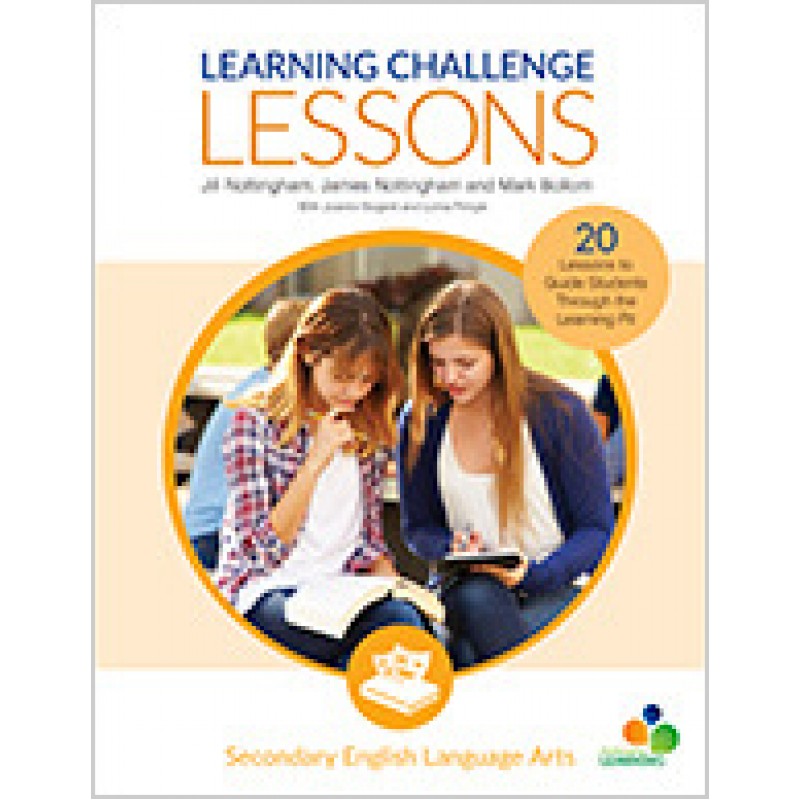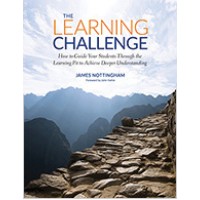Learning Challenge Lessons, Secondary English Language Arts: 20 Lessons to Guide Students Through the Learning Pit, Jun/2019
| Author(s) | Jill Nottingham, James A. Nottingham, Mark Bollom, Joanne Nugent, Lorna Pringle |
| ISBN10 | 1544330529 |
| ISBN13 | 9781544330525 |
| Format | Paperback |
| Pages | 264 |
| Year Publish | 2019 June |
Synopsis
Practical strategies for bringing The Learning Challenge to life in your secondary ELA classroom
The Learning Challenge has captured the imaginations of educators, students, and their parents by introducing the idea of Learning Pit”—a state of cognitive conflict that causes students to think more deeply, critically, and strategically until they discover their “eureka!” moment.
Now, fans of the The Learning Challenge who want practical examples and ready-to-use lessons for their secondary ELA classrooms need not look any further. This book provides teachers with everything they need to run thoughtful, dialogue-driven challenges so that students engage more deeply with the classics and develop literary skills critical to ELA standards. Students will analyze texts in lessons grounded in cognitive conflicts such as
- We are all responsible for our own actions, and yet we sometimes act because we are following orders or instructions from others (Lesson 1: Who was responsible for the death of William in Mary Shelley’s Frankenstein?)
- To be successful you cannot fail, but most successful people have experienced many failures along the way (Lesson 7: Was Jay Gatsby a success?)
- Love is impossible to define, and yet everyone knows what love is (Lesson 11: Is Romeo really in love?)
From detailed lesson plans and activities for running Learning Challenges in the classroom, to full-colour activity cards that enhance each lesson, this must-have resource offers relevant and timely instructional strategies on topics that interest and engage secondary students.
About the Authors:
Jill Nottingham’s background is in teaching, leadership and consultancy. She has been a teacher and leader in kindergartens and schools in some of the more socially deprived areas of North East England. During that time, she developed many approaches to teaching children how to learn that are still being used in schools and taught in universities today.
Jill has also trained with Edward de Bono at the University of Malta, and has studied for a Masters degree in Education with the University of Newcastle.
Jill now leads Challenging Learning’s pre-school and primary school consultancy. She has written many of the Challenging Learning teaching materials, has edited the others, and is currently writing 3 books for schools and 2 books for pre-schools. In amongst this she finds time to be the mother of 3 gorgeous children!
James Nottingham is co-founder and director of Challenging Learning, a group of companies with 30 employees in 6 countries. His passion is in transforming the most up-to-date research into strategies that really work in the classroom. He is regarded by many as one of the most engaging, thought-provoking and inspirational speakers in education.
His first book, Challenging Learning, was published in 2010 and has received widespread critical acclaim. Since then, he has written 6 books for teachers, leaders, support staff, and parents. These books share the best research and practice connected with learning; dialogue; feedback; the learning pit; early years education; and growth mindset.
Before training to be a teacher, James worked on a pig farm, in the chemical industry, for the American Red Cross, and as a teaching assistant in a school for deaf children. At university, he gained a first-class honours degree in education (a major turnaround after having failed miserably at school). He then worked as a teacher and leader in primary and secondary schools in the UK before co-founding an award-winning, multi-million-pound regeneration project supporting education, public and voluntary organisations across north east England.
Skolvärlden (Swedish Teaching Union) describes James as “one of the most talked about names in the world of school development” and the Observer newspaper in the UK listed him among the Future 500 - a “definitive list of the UK′s most forward-thinking and brightest innovators.”


